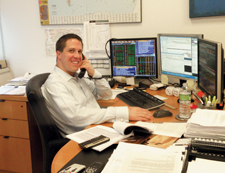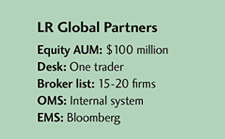It’s been a three-year trial by fire for Brad Desjarlais of New York-based LR Global Partners. Desjarlais trades in places that are as foreign to traditional U.S. stock pickers as they are exotic–try trading on the Colombo Stock Exchange in Sri Lanka or the Dhaka Stock Exchange in Bangladesh. Consequently, it’s no surprise that he’s never faced a more challenging–yet rewarding–experience during his 12 years in the business.

"It’s like the Wild West," said Desjarlais, who started his career at Instinet before moving to Columbia Management in Boston to trade large caps and programs in 2002. A lack of time and sales can be a major roadblock when trying to build a picture in a stock, he said, and every market has its own nuances. "In some of these markets," he said, "a stock might not print for three days."
But these inefficiencies and information gaps also provide great opportunity for investors who move beyond the risk profile of the emerging markets and into the abyss of the so-called frontier markets.
Strong relationships with local brokers pay off if you’re going to trade thin markets like Kazakhstan, Vietnam, South Africa, and Kenya, he said. Those relationships provide an edge in not only finding liquidity, but also in getting information that could aid a portfolio manager on current and potential holdings.
"Once the local brokers know that you’re a trusted source of capital, a trading partner that’s in it for the long haul, that’s when the real information starts to come out," Desjarlais said. LR Global Partners was spun out of the Rockefeller family office in 1997. Leon Levy of Oppenheimer Funds and Odyssey Partners fame was an initial investor.

Still, Desjarlais knows that foreigners are often at a disadvantage. In Bangladesh investors are given an identification number, so others in the market know when there is foreign interest. "When they get the sense there’s a foreign buyer around, the stock just continues to walk up and walk up," he said.
"Some of the markets and names can be pretty difficult to trade–and expensive," he added. Besides huge implicit costs like market impact, even explicit costs can be daunting, he said. Some markets have local bank fees and a separate transaction tax. Then commissions can be between an additional 30 and 150 basis points. And that doesn’t even address country risk in the investment itself, he added.
The most developed and transparent market he trades is AIM, the junior market on the London Stock Exchange. That’s where many of the firm’s natural resources holdings from Kazakhstan are listed. Market impact costs of from 15 to 20 percent there can be expected.
Due to the high costs of a round trip, LR Global looks to buy into the type of companies that will return up to 10 times its initial investment. Every day, Desjarlais gains more expertise in the local cultures and markets, but it does come much slower than would happen in more developed markets, he explained: "I’m thousands of miles away, and I don’t have the luxury of flying down to, say, Kenya and hanging out at the exchange to see how orders are worked."




